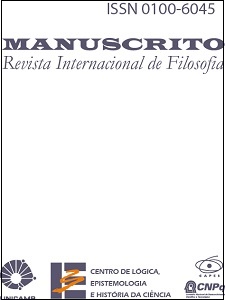Resumo
Cappelen e Lepore argumentam que o contextualismo moderado não é uma posição estável, uma vez que os argumentos que o sustentam o colocam em uma encosta escorregadia que conduz ao contextualismo radical. Meu objetivo é estabilizar o contextualismo moderado (ou pelo menos uma versão do mesmo) provendo um tratamento dos tipos de argumentos nos quais ele deveria estar sustentado. Estes diferem dos argumentos contextualistas usuais porque eles partem das intuições dos falantes sobre o valor de verdade de sentenças proferidas, e não sobre o que estas sentenças dizem. Dadas certas condições de sistematicidade, claridade e quão difundidas estas intuições são, eu afirmo que temos boas evidências para determinar se uma expressão é sensível ao contexto. Ainda que este método identifique expressões quantificadoras e ‘chove’ como sensíveis ao contexto, ele não faz o mesmo com ‘vermelho’. Temos assim motivações prima facie para o contextualismo moderado que não leva ao contextualismo radical. No entanto, esta metodologia não distingue o contextualismo do relativismo. Assim, eu examino diferentes razões para introduzir elementos nos contextos de uso e nas circunstâncias de avaliação. Palavras chave:
Abstract:
Cappelen and Lepore argue that moderate contextualism is not a stable position for the arguments that support it put it on a slippery slope to radical contextualism. My aim is to stabilize moderate contextualism (or at least a version of it) by providing an account of the sorts of arguments it should rely on. These differ from standard contextualist arguments in that they rely on speakers’ intuitions about the truth-value of uttered sentences, and not about what such utterances say. Given certain conditions of systematicity, clarity and how widespread these intuitions are, I claim we have good evidence for determining whether an expression is context sensitive. Although this method does render quantifier expressions and ‘to rain’ context sensitive, it does not do so with ‘red’. We thus obtain prima facie motivation for moderate contextualism that does not lead to radical contextualism. However, the methodology does not distinguish contextualism from relativism. I thus run through different reasons for introducing elements into contexts of use and elements into circumstances of evaluation.
Keywords: Semantic content. What is said. Quantifier expressions. Minimalism. Relativism.
Referências
ALMOG, J., PERRY, J., WETTSTEIN, H. (eds.). Themes from Kaplan. Oxford: Oxford University Press, 1989.
BACH, K. “You Don’t Say?”. Synthèse, 128, pp. 15-44, 2001.
BEZUIDENHOUT, A. “Truth-Conditional Pragmatics”. Philosophical Perspectives, XVI, pp. 105-134, 2002.
BEZUIDENHOUT, A. “The Coherence of Contextualism”. Mind and Language, XXI, pp. 1-10, 2006.
BORG, E. Minimal Semantics. Oxford: Oxford University Press, 2004.
BRAUN, D. “Demonstratives and their Linguistic Meanings”. Noûs, XXX, pp. 145-173, 1996.
CAPPELEN, H., LEPORE, E. Insensitive Semantics. Oxford: Blackwell, 2005.
CAPPELEN, H., LEPORE, E. “Reply to Kent Bach”. Philosophy and Phenomenological Research, v. LXXIII, n. 2, pp. 469-473, 2006.
CARSTON, R. Thoughts and Utterances: The Pragmatics of Explicit Communication. Oxford: Blackwell, 2002.
CLAPP, L. “Minimal (Disagreement About) Semantics”. In: G. Preyer and G. Peter (eds.) (2007), pp. 251-277.
CRESSWELL, M. J. Semantic Indexicality. Dordrecht: Kluwer, 1996.
EZCURDIA, M. “Pragmatic Attitudes and Semantic Competence”. Crítica. Revista Hispanoamericana de Filosofía, XXVI, pp. 55- 82, 2004.
EZCURDIA, M. “Me, Myself, ‘I’”, forthcoming.
GARCÍA-CARPINTERO, M., KÖLBEL, M. (eds.). Relative Truth. Oxford: Oxford University Press, 2008.
GLANZBERG, M. “Context, Content and Relativism”. Philosophical Studies, CXXXVI, pp. 1-29, 2007.
HALE, B., WRIGHT, C. (eds.). A Companion to the Philosophy of Language. Oxford: Blackwell, 1997.
HAWTHORNE, J., ZIMMERMAN, D. (eds.). Language and Philosophical Linguistics, Philosophical Perspectives 17. Oxford: Blackwell, 2003.
KAPLAN, D. [1977]. “Demonstratives”. In: J. Almog, H. Wettstein and J. Perry (eds.) (1989), pp. 481-563.
KING, J. “Tense, Modality and Semantic Value”. In: J. Hawthorne and D. Zimmerman (eds.) (2003), pp. 195-245.
KÖLBEL, M. “Motivations for Relativism”. In: M. GarcíaCarpintero and M. Kölbel (eds.) (2008), pp. 1-38.
KÖLBEL, M. Truth without Objectivity. London: Routledge, 2002.
LESLIE, S. “Moderately Sensitive Semantics”. In: G. Preyer and G. Peter (eds.) (2007), pp. 133-168.
LEWIS, D. “Scorekeeping in a Language Game”. Journal of Philosophical Logic, VIII, pp. 339-359, 1979.
PAGIN, P., PELLETIER, J. “Content, Context and Composition”. In: G. Preyer and G. Peter (eds.) (2007), pp. 25-62.
PERRY, J. “Thought without Representation”. Aristotelian Society Supplementary Volume, LX, pp. 205-225, 1986.
PERRY, J. [1993a]. “Postscript/Afterword to ‘Thought without Representation’”. In: J. Perry (1993b), pp. 17-31.
PERRY, J. The Problem of the Essential Indexical and Other Essays. Oxford: Oxford University Press, 1993b.
PREYER, G., PETER, G. (eds.). Context-Sensitivity and Semantic Minimalism: New Essays on Semantics and Pragmatics. Oxford: Oxford University Press, 2007.
RECANATI, F. Literal Meaning. Cambridge: Cambridge University Press, 2004.
RECANATI, F. Perspectival Thought: A Plea for (Moderate) Relativism. Oxford: Oxford University Press, 2007.
RICHARD, M. “Contextualism and Relativism”. Philosophical Studies, CXIX, pp. 215-242, 2004.
SAINSBURY, M. [2001]. “Two Ways to Smoke a Cigarette”. Ratio, XIV, pp. 386-406. Partially reprinted in Sainsbury (2002).
SAINSBURY, M. Departing from Frege: Essays in the Philosophy of Language. London: Routledge, 2002.
SALMON, N. Frege’s Puzzle. Atascadero, CA: Ridgeview, 1986.
SOAMES, S. Beyond Rigidity. Oxford: Oxford University Press, 2002.
STANLEY, J. “Context and Logical Form”. Linguistics and Philosophy, XXIII, pp. 391-434, 2000.
STANLEY, J. Knowledge and Practical Interests. Oxford: Oxford University Press, 2005.
STANLEY, J., SZABO, Z. “On Quantifier Domain Restriction”. Mind and Language, XV, pp. 219-5, 2000.
STANLEY, J., WILLIAMSON, T. “Quantifiers and Context Dependence”. Analysis, LV, pp. 291-295, 1995.
TAYLOR, K. “A Little Sensitivity Goes a Long Way”. In: G. Preyer and G. Peter (eds.) (2007), pp. 63-93.
TRAVIS, C. “On Being Truth-Valued”. In: S. L. Tsohatzidis (ed.) (1994), pp. 167-186.
TRAVIS, C. “Meaning’s Role in Truth”. Mind, 100, pp. 451-466, 1996.
TRAVIS, C. “Pragmatics”. In: B. Hale and C. Wright (eds.) (1997), pp. 87-107.
TSOHATZIDIS, S. L. (ed.). Foundations of Speech Act Theory. London: Routledge, 1994.

